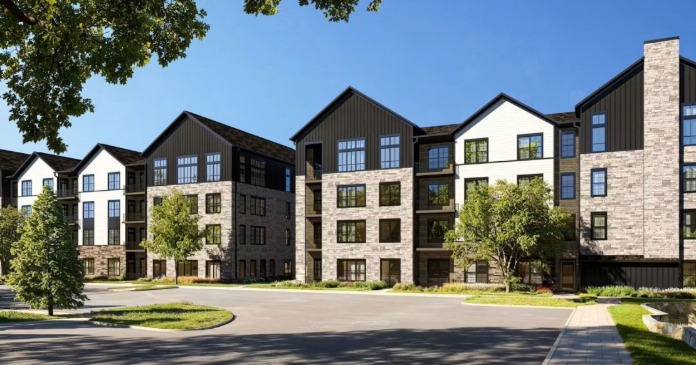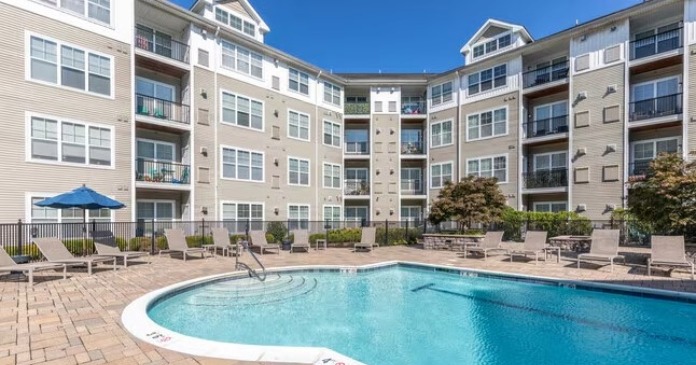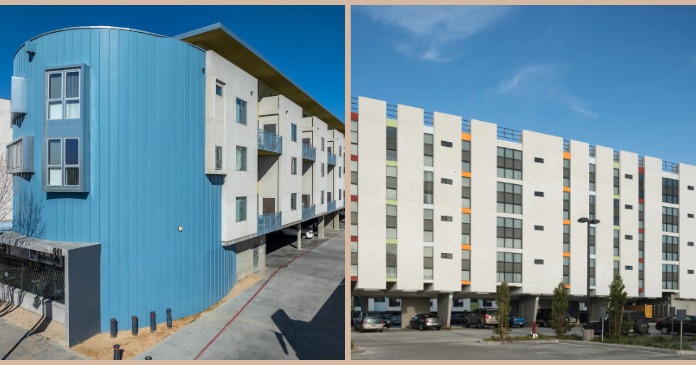
The OPTECH 2023 conference and expo in November attracted attendees from all corners of the multifamily space. It was the largest in the conference’s history, according to Julianne Goodfellow, National Multifamily Housing Council’s (NMHC) director of government affairs.
The three-day OPTECH conference is one of the NMHC’s annual flagship events where multifamily operators meet with top technology providers to discuss taking their business to the next level.
The focus this year was on customer experience technology, connectivity trends (including managed wifi), automation trends, smart energy and application trends, and software integration.
Over the years, OPTECH attendees have typically been split 60-40 between vendors and property management companies, said Dom Beveridge, principal with 20 for 20, a multifamily technology company.
This year, as the below charts from NMHC indicate, about 90 percent of attendees were either multifamily owner/operators or vendors. Of these, 60 percent were vendors and 30 percent property management companies—essentially a 2 to 1 vendor-to-buyer ratio, and the composition of vendors was skewed toward connectivity providers, explained Beveridge on 20 for 20’s website.
Ben Steward, co-founder of Revyse, a vendor discovery and review platform that helps companies find the best software and services for their business, said, “The sessions were some of the best of any show I have attended. The panelists were thoughtfully selected, operator skewed, covered a broad range of pressing topics and were well moderated.”
“The expo hall was packed and I understand there were more than one hundred vendors on the waiting list. It was hard to capture attention on the show floor if meetings with vendors were not preset. But we knew from our own buyer survey that only 12 percent of buyers start their search for new vendors at a trade show. Buyers are doing their homework online,” said Steward.
Recession worries still linger, and that was apparent at the conference. Analysts and economists fielded questions at a town hall around protecting against risk and recognizing opportunities in an environment of rising mortgage and cap rates, stagnating rent growth and escalating insurance costs.
The star of the show
Managed wifi received plenty of coverage in sessions about connectivity in buildings. Other sessions focused on reputation and risk management, a hot topic at a time when the multifamily industry is facing a number of federal and state level actions that are creating compliance challenges for providers, owner/ operators and suppliers.
“But the star of the show was AI,” said NMHC president Sharon Wilson Geno in an interview with Yield Pro this month.
Adlan Fellah, chief analyst at MDU Experts, a company that specializes in research, consulting and tools for multifamily technology markets, said, “Owner/operators on many of the panels talked about the value propositions of technology innovation and are excited about AI’s potential to meet customer needs, give a competitive edge, manage risk and drive efficiency.”
“AI came up in every panel in some fashion and there is excitement around its possibilities and some trepidation, uncertainty and concerns as to how it will be regulated,” said Geno, whose panel on AI discussed using the technology to screen renters, primarily in subsidized housing.
“There’s a perception that the robots are now selecting residents and that it’s not fair to underserved populations and people with low income. Some argue we shouldn’t use the robots, but they are not going away,” she said, stressing the importance of testing to ensure that AI is not reflecting discriminatory practices that are inherent in any human decision making.
“All AI does is reflect, on a macro level, the decisions humans have made and uses it to evaluate applicants. We have technology that collects all the data and then removes some of those biases.
“If you talk to software engineers, they will tell you they can emphasize or de-emphasize any factor to make the process more equitable and remove human bias. And, studies going back 20 years show that when you remove the visual of people sitting face to face, you get more equitable outcomes,” said Geno.
Also discussed was using humans and AI together to create less discriminatory practices and provide better transparency for renters going through the rental process.
Beveridge said a session on AI and automation in maintenance provided a good example of how operational limitations can constrain technology adoption. He said panelists shared ideas for using AI proactively, including smarter diagnostic tools for directing maintenance work and equipping technicians with better information for handling work orders.
“AI helps identify maintenance issues by filtering questions even before the maintenance tech goes out to the unit,” said Geno. “By eliminating the tech’s need to make diagnostics assessments when he gets to the unit and then have to go back and get the tools and parts for the job, AI has the potential to increase customer experience and lower costs,” she said.
EV charging
Electric vehicle charging got a lot of attention at the conference. It was a preference included in the reveal of this year’s NMHC/Grace Hill Rental Preferences Study.
“While there are not yet a lot of renters nationally who own electric cars, it’s coming,” said Geno. According to the preference survey, a majority of renters see themselves buying an electric car at some point in the future.
“This will depend on the cost of EVs coming down to within the price of gas-powered vehicles. But an issue for property owners is that a lot of localities are initiating mandates at great expense beyond the cost of the EV charging station itself, like fire suppression and other safety things, when the electric car industry hasn’t even caught up to the very reason we are needing them. So, we need to start thinking proactively to be prepared for it,” said Geno.
Beveridge explained the benefits EV charging stations might offer operators include the recovery of electricity costs and the potential to prioritize residents’ access to the property. Future benefits might include electricity trading between vehicle and grid.
“But for now, we must consider return on investment (ROI)—and in that regard, EV charging looks like the hotel gym of multifamily amenities. To what extent they will use it and, more broadly, whether it’s really up to multifamily to solve for vehicle charging remains to be seen,” said Beveridge.
Finding the new normal
Most industry leaders agreed that AI has the potential to change the the property manager’s role and how multifamily rentals are marketed and managed. Panels explored the difference between traditional AI, which property managers use for predictive purposes like identifying emergency maintenance issues, and generative AI used in chatbots, for scheduling tours, answering queries and contacting residents.
“They also discussed how technology affects the need for leasing consultants, and the industry consensus is that tech should assist, not replace people,” said MDU’s Fellah.
Geno said this is relevant because the industry is still trying to figure out the new post-pandemic normal. The remote work that everyone was forced to do during the pandemic is ending, but, according to the preferences study, a hybrid work environment is still a renter preference, making cost-effective, managed wifi more important to renters.
COVID affected the labor force itself, said Geno. While multifamily has traditionally been operated with onsite staff dedicated to serving residents, the pandemic made it more difficult to source people to fill that need.
“So, now we must create and use tech to accomplish some of those functions while we look for people in the labor force—or, maybe we are better off and it’s more cost effective without some of them,” said Geno.
A related topic was centralization of operations, a trend Geno is confident will continue. “Many companies are considering consolidation because it offers considerable value in terms of operations and enhanced customer experience,” she said.
Debunking the junk
Other topics of interest were short-term rentals and legislation around junk fees. The Biden Administration has made an issue of protecting renters from them and some legislation already has operators in the crosshairs.
One panel focused on a law that took effect in Colorado in August limiting what landlords can charge for services to no more than $10 or two percent of what they have already paid for through a third party.
“In regard to the attempts to regulate fees, our position as an organization and as it represents the thoughtfulness of our members is transparency, transparency, transparency!” said Geno.
“Any info about fees for services we provide to applicants, the sooner we provide it, the better. Then, if an applicant is rejected and they are charged, we can explain why there is a legitimate charge for service over and above the cost of rent.
But we must be proactive and set standards before someone else sets them for us,” said Geno.
Operating costs
Another topic was the pressure owner/operators are feeling around increasing operating costs in today’s economic environment. Technological solutions that might make housing operations easier must be weighed against cost, said Geno.
“The multifamily folks are looking toward technology adoption and operational improvements while considering the financial and human-resource side, said Fellah.
“COVID forced multifamily to adopt a ton of new software quickly,” said Beveridge. “Operators are now taking stock of the sheer number of dashboards users log into and just how much software is being used to run a multifamily operation today—and it’s a ton,” he said.
“With so many new products out there, particularly around customer experience, the question for operators is which of these give the best bang for the buck around the equally important cost of operations. That’s why our preference survey is so important. It gives owner/operators insight into what renters are thinking about and the kind of tech solutions that mean the most to them.”
“But it always comes down to the bottom line—does it make sense financially to adopt the new tech?” said Geno.
Despite recession fears and the nation’s economic uncertainty, Geno said she left the conference with her head brimming with ideas. “There’s always a lot of collaboration in the space and I really appreciate that. It’s how we continue moving our industry forward.”
Next year’s OPTEC conference will be held in October in Washington, D.C.
See the graphic version of this article in the November December 2023 flip book version.












